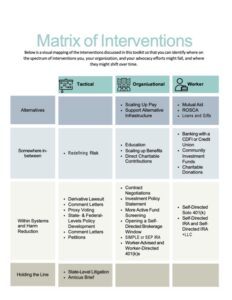Why a Toolkit?
When we think about all of the ways we are invested in our communities, we often don’t think about our retirement savings. Yet, the total amount of retirement assets in the United States is about $44.1 trillion and accounts for 34% of all household assets. Of that, $12.4 trillion is currently invested in “defined contribution” plans—think your 401(k) or 403(b)—and $8.9 trillion in government “defined benefit” plans (i.e., public pensions). That is a lot of money! However, who gets to participate in our retirement systems, how decisions are made about our retirement money, and how that money is used before we retire is often complex, and frankly, hard to navigate in a way that is aligned with our values.
Traditional retirement funds often include funds from corporations that are harming vulnerable populations. Even funds that are supposed to be less harmful often still hold funds from corporations that have a negative impact on communities. So, what are the alternatives for someone who wants to align their retirement investments with values that center thriving communities and ecosystems? And what are some interventions to consider at the tactical, organizational, and worker level? This toolkit explores these questions along a spectrum of care.
Who is this Toolkit For?
This toolkit is meant to support individuals, organizations, foundations, policymakers, and values-aligned financial professionals in reenvisioning the retirement landscape.
Why Should We Care about Our Retirement Funds?
Our retirement savings make up a large percentage of the economic puzzle in the U.S., and there is tremendous potential to reenvision how we think about these resources:
Who gets to participate?
The amount of wealth held in traditional retirement savings systems is staggering—yet, not everyone has access to that wealth. Among the lowest third of earners who have retirement savings in the United States, white people have 345% more savings than their Black counterparts. Only 49% of Black women have retirement savings, compared to 62% of the overall population (this is inclusive of all assets, like a home). This disparity is due, in large part, to well-documented systemic inequities in wealth and income that have compounding effects in retirement. Disparities in worker pay, unemployment, access to benefits, intergenerational wealth, asset ownership, savings, and other factors over a lifetime affect if and how much a worker can save for retirement.
Who makes decisions?
Our retirement savings investments? are largely out of our hands. For the majority of those who do have retirement savings, that money is invested in either a defined contribution plan or a defined benefit plan. We might get to decide how much to contribute to this plan, and might even have the ability to pick certain pooled funds the plan is invested in, but that is where investor choice at traditional financial institutions begins and ends. For the curious investor, it can also be difficult to learn where these pooled funds are actually invested, and once you do, you may be surprised to learn what companies your retirement funds are supporting!
What is this Resource?
This guide offers some creative and unconventional ways that employers, workers, and values-aligned fund managers might leverage retirement savings to benefit communities. The toolkit explores how we might reenvision retirement along a spectrum of interventions and community care: from harm reduction to divesting from traditional financial structures altogether. We invite you to reenvision retirement investing as rooted in a model based on solidarity and community care by considering these interventions at the tactical, organizational, and worker levels:

Next Steps: Resources and a Community of Practice
October 30th: Webinar “Putting Your Money Where Your Mission Is: Philanthropic Strategies for Divestment and Impact Investing” hosted by Grantmakers Concerned with Immigrants and Refugees. Register Here.
Download the Toolkit HERE
Author
-

Rachel Fagiano is a Senior Fellow at Funders for Justice. They work to support people and organizations in pursuit of intersectional justice by designing grantmaking programs that advance racial, economic, and gender justice across the United States and internationally. In addition, Rachel serves on the leadership team of Racial Justice Investing, a coalition of investors, asset owners, and business leaders who are taking action for racial justice within their own organizations, portfolio companies, and the field.